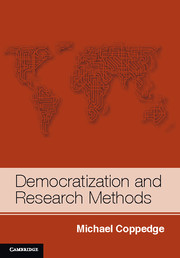Book contents
- Frontmatter
- Contents
- List of tables
- List of figures
- Acknowledgments
- 1 Research methods and democratization
- 2 Defining and measuring democracy
- 3 Criteria for evaluating causal theories
- 4 Checklists, frameworks, and Boolean analysis
- 5 Case studies and comparative history
- 6 Formal models and theories
- 7 Rigor in extensive and intensive testing
- 8 Political culture and survey research
- 9 Quantitative testing
- 10 An agenda for future research
- References
- Index
9 - Quantitative testing
Published online by Cambridge University Press: 05 July 2012
- Frontmatter
- Contents
- List of tables
- List of figures
- Acknowledgments
- 1 Research methods and democratization
- 2 Defining and measuring democracy
- 3 Criteria for evaluating causal theories
- 4 Checklists, frameworks, and Boolean analysis
- 5 Case studies and comparative history
- 6 Formal models and theories
- 7 Rigor in extensive and intensive testing
- 8 Political culture and survey research
- 9 Quantitative testing
- 10 An agenda for future research
- References
- Index
Summary
In Chapter 3, I argued that the three fundamental goals of research are generality, integration, and thickness and that each of the three main approaches accomplishes one of these goals well and two of them poorly. In Chapter 5, I argued that case studies maximize thickness but do little for generality or integration. In Chapter 6, I argued that formal models and theories pursue theoretical integration, but often at the expense of thickness and generality. In this chapter, I argue that quantitative research achieves generality better than other approaches but tends to be thin and poorly integrated.
More specifically, the goal of quantitative analysis is to estimate the strength and significance of the average impact of one or more independent variables on a dependent variable while holding other variables constant. This kind of analysis is most appropriate for extensive testing, as described in Chapter 7. For example, it is appropriate if one wants to know how much more likely a presidential democracy is to break down than a parliamentary democracy, on average, controlling for level of economic development; how much more democratic one would expect a rich country to be than a poor one, on average, after holding colonial heritage and ethnic fragmentation constant; or whether the typical Latin American country is more democratic than the typical Asian country, other things being equal. Quantitative research is not, however, appropriate for intensive testing, which has the very different goal of determining which theory best explains a single outcome or small set of outcomes. In quantitative analysis, it is accepted that many cases will not be well explained, and this is not considered a problem so long as the average tendency can be estimated well.
- Type
- Chapter
- Information
- Democratization and Research Methods , pp. 257 - 309Publisher: Cambridge University PressPrint publication year: 2012



